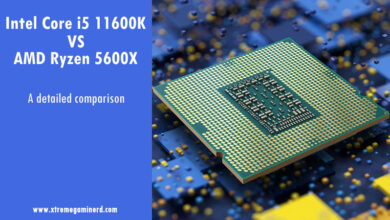CPU or Processor is the brain of a computer and it is responsible for all the complex operations you see on your screen.
As the CPU works harder than any other computer in general, you might be curious about how long your CPU will last.
As an electronic component, it is also prone to wear and tear with time just as any other computer component. However, there is a difference between the lifespan of a CPU and any other PC component which I am going to explain below.
How Long Does A CPU Last?
This question doesn’t have a fixed answer. The lifespan of a CPU depends on how it is used and the circumstances under which it is used.
Generally, CPUs are the last PC components to die in a computer, and therefore, you can expect your CPU to live on for many years while other parts such as the hard drive, GPU, motherboard, and other parts die.
There is no concrete evidence or data on the average lifespan of CPUs. However, when we combine our own experience with CPUs along with other tech enthusiasts, the CPUs don’t die easily. They generally live for a lifetime which can be in decades.
Average CPU Lifespan
So, basically, a CPU can live up to 20 or 30 years if used properly and the least you could expect is 10 years when you abuse it a little bit.
As of now AMD and Intel are the major CPU manufacturers that provide 3 years of warranty on their CPUs. CPUs use silicon dies and several other electronic components like transistors which are present in billions.
A CPU uses electrical signals to operate and that leads to a temperature rise in a CPU. If the CPU is kept below the critical temperature or the danger zone, it won’t die easily.
A normal and healthy temperature of a CPU while gaming or doing any other task is between 60C-80C. The danger zone falls above 90C with some processors being exceptions to this case.
Why Can’t CPU Work Forever?
A CPU is an electronic part that goes through intensive processes continuously. It is prone to wear and even though its lifespan is surprisingly much higher than other components, it will die someday.
When the voltage passes through the CPU circuitry, the CPU components start heating up. Whenever the computer is switched off, the CPU cools down. This simultaneous process of heating up and cooling down degrades the CPU over time.
Does CPU Overclocking Reduces Lifespan?
A CPU’s speed is called Clock Frequency and is measured in MHz or GHz. It is the total number of calculations a CPU can do every second. You will find CPU clock frequencies of most CPUs today somewhere between 2.0-6.0GHz.
The faster the CPU runs, the more likely it is to get heated quickly. Now through overclocking, the clock frequency of a CPU can be increased beyond its mentioned limit or range. This means that if a CPU is designed to run between 3.3-4.3GHz, with overclocking, it can surpass 4.3GHz by a few hundred MHz.
However, CPU manufacturers produce two types of CPUs where one is fully locked and can’t be overclocked and the other category has overclockable CPUs.
Is CPU Overclocking Safe?
In case you are thinking about overclocking your CPU but fear a reduction in the CPU lifespan, we can safely say that it generally doesn’t reduce the lifespan of a CPU.
Simply raising the core clock of your CPU will increase the temperature but if it is below the danger zone, you are good to go. Manufacturers generally warn about overclocking as it may reduce the lifespan but it only applies to those CPUs that are consistently hovering around the danger zone for a long time.
It is, therefore, recommended to use a good CPU cooler that can keep the temperatures down to keep operating at the overclocked frequency or your CPU may overheat and start to throttle.
When the thermal throttling starts, the CPU will shut down itself for good so that it won’t do any physical damage. So, this keeps your CPU safe from frying.
Final Words
You don’t have to worry about your CPU dying sooner. It will take care of itself but you should always keep it cooling using a proper cooling solution. That said, most users change their CPUs before the CPUs die. So, finding an accurate lifespan of a CPU is not possible and is subject to its usage.






